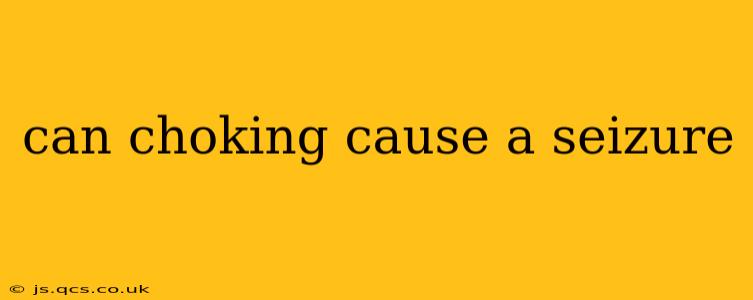Can Choking Cause a Seizure? Understanding the Connection
Choking, a life-threatening emergency, and seizures, neurological events characterized by involuntary muscle contractions, might seem unrelated. However, a crucial link exists: oxygen deprivation. While choking doesn't directly cause a seizure in the way a neurological condition might, the severe lack of oxygen (hypoxia) resulting from choking can trigger a seizure in susceptible individuals. Let's delve deeper into this complex relationship.
What Happens During Choking?
Choking occurs when an object obstructs the airway, preventing air from reaching the lungs. This leads to a rapid decrease in blood oxygen levels. The brain, being highly sensitive to oxygen deprivation, is particularly vulnerable. The longer the airway remains blocked, the more severe the oxygen deprivation becomes.
How Oxygen Deprivation Can Lead to Seizures
The brain requires a constant supply of oxygen to function properly. When oxygen levels plummet due to choking, the brain's normal electrical activity becomes disrupted. This disruption can manifest as a seizure, especially in individuals with pre-existing conditions that make them more prone to seizures, such as epilepsy. Even in individuals without epilepsy, prolonged and severe hypoxia can overwhelm the brain's capacity to compensate, resulting in a seizure. Think of it as the brain's emergency response to a critical lack of oxygen.
Can Choking Cause a Seizure in Someone Without Epilepsy?
While less common, yes, choking can cause a seizure even in someone without a history of epilepsy. The severity and duration of the choking episode are key factors. A brief choking incident might resolve without incident, but prolonged choking significantly increases the risk of seizure due to the extended period of hypoxia. The brain's resilience varies from person to person, so the threshold for seizure onset differs.
What are the Symptoms of Choking?
Recognizing the signs of choking is critical for prompt intervention. Symptoms can include:
- Inability to speak or cough forcefully
- Difficulty breathing
- Clutching the throat
- Blue discoloration of the skin (cyanosis)
- Loss of consciousness
If you suspect someone is choking, immediate action is necessary. Learn and practice the Heimlich maneuver. Early intervention can prevent prolonged hypoxia and potentially avert a seizure.
Does a Seizure Always Follow Choking?
It's crucial to understand that choking doesn't always lead to a seizure. Many choking incidents resolve before significant hypoxia develops. However, the potential for seizure is a serious consideration, especially if the choking episode is prolonged or severe. The severity of the oxygen deprivation is the crucial determining factor.
What Should I Do if Someone Chokes and Has a Seizure?
This is a medical emergency requiring immediate professional help. While waiting for emergency services:
- Ensure the airway is clear (if possible and safe to do so).
- Protect the person from injury during the seizure.
- Do not restrain them.
- Note the duration of the seizure and any other symptoms.
This information is for general knowledge and should not be considered medical advice. Always consult a healthcare professional for any health concerns or emergencies. Learning CPR and the Heimlich maneuver is highly recommended for anyone who interacts with children or elderly individuals.
